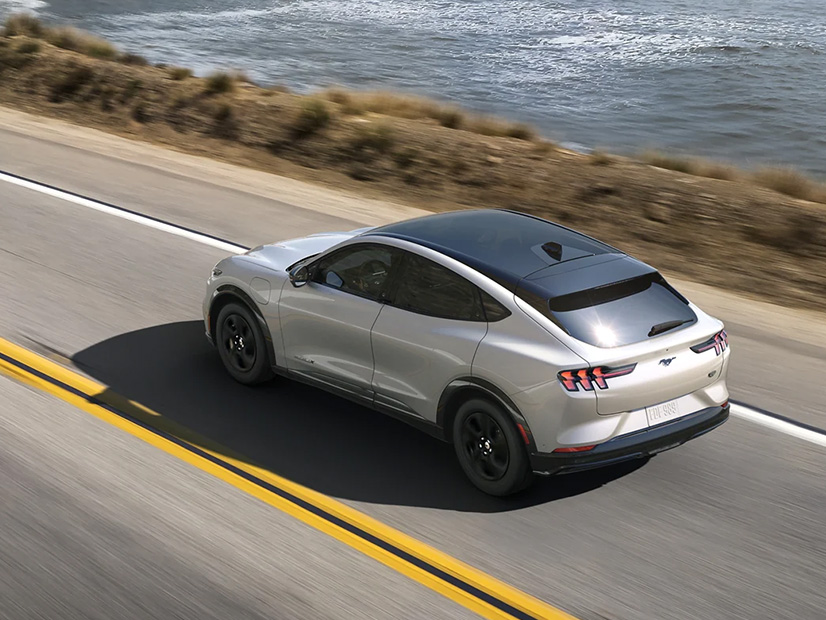The U.S. Treasury Department just made its March deadline for issuing guidelines on the domestic content provisions for electric vehicle tax credits in the Inflation Reduction Act, with the Friday release of a Notice of Proposed Rulemaking that a senior department official said could cut the number of EVs eligible for the credit in the short term.
At present, 21 models qualify for the full $7,500 tax credit for new EVs authorized in the IRA, the official said during a prerelease press briefing. But, he said, “the critical minerals and batteries component requirements will reduce the number of electric vehicles currently eligible for the full credits in the short term in order to create incentives to bring supply chains and manufacturing to the United States. However, we believe these requirements will significantly increase the number of vehicles made and sold in the U.S. over the next decade as new investments and American production come online.”
The new rule will go into effect April 18, and the Treasury Department will update its list of models that qualify for either the partial or full tax credit, the official said.
With the new rules, the Biden administration appears to be balancing implementing the IRA as written — a flashpoint between the White House and Sen. Joe Manchin (D-W.Va.) — and providing a pathway for European and Asian manufacturers to qualify for the credits and remain competitive in the U.S. market at the behest of allies.
The new rules “will give manufacturers more certainty so they can make plans to onshore more of their supply chains in the coming years, and it will ensure we can work with our allies and partners to reduce our reliance on China and bolster our national security,” a senior White House official said.
China’s global dominance in the processing of critical minerals, like lithium and cobalt, and EV battery components has become a national security issue, one that Manchin intended the EV tax credits in the IRA to address while also building out domestic supply chains.
The law originally required Treasury to issue the domestic content guidelines in December. In January, Manchin took to the Senate floor in an unsuccessful bid to get an immediate vote on a bill that would have required Treasury to immediately implement the domestic content provisions.
But the NOPR hews closely to the language and intent of the IRA provisions that require that EVs meet specific domestic content percentages to qualify for the full $7,500 tax credit. For example, this year 40% of the value of critical minerals contained in an EV battery “must be extracted or processed in the United States or a country with which the United States has a free-trade agreement, or recycled in North America,” according to the Treasury Department announcement. That percentage will go up 10% every year, through 2027, at which time the required percentage will be 80%.
Similarly, the domestic content provisions set a 50% requirement for battery components in 2023, increasing 10%/year to 100% by 2029.
In addition, beginning in 2024, “an eligible clean vehicle may not contain any battery components that are manufactured by a foreign entity of concern,” the Treasury announcement said. In 2025, critical minerals extracted, processed or recycled by a foreign entity of concern will also be prohibited. At present, the U.S. State Department identifies China, Russia, North Korea and Iran as foreign entities of concern.
The NOPR also provides a list of countries that currently have free-trade agreements with the U.S.: Australia, Bahrain, Canada, Chile, Columbia, Costa Rica, the Dominican Republic, El Salvador, Guatemala, Honduras, Israel, Japan, Jordan, Mexico, Morocco, Nicaragua, Oman, Panama, Peru, Singapore and South Korea.
Chile is a key source of lithium, and Canada also mines a range of critical minerals. Japan and the U.S. signed a critical mineral agreement on Tuesday that appears to meet the free-trade provisions in the NOPR, such as refraining from imposing new trade barriers or restrictions on exports of critical minerals.
A Bumpy Road to Implementation
Since Biden signed the IRA in August, the law’s EV tax credits have had a bumpy path to implementation, with consumers and car dealers alike trying to untangle the law’s limits not only on domestic content but on consumer income and EV prices.
The 30D tax credit, as it is officially known, provides consumer incentives of up to $7,500 for the purchase of a new EV. The two-part credit includes $3,750 for EVs assembled in North America and another $3,750 based on whether the minerals in the battery are produced or processed in North America or a free-trade country.
In addition to qualify for the credit, the manufacturer’s suggested retail price for a light-duty passenger vehicle cannot exceed $55,000. The limit for SUVs and pickups is $80,000.
The income limits are $150,000 per year for individuals, $225,000 for single heads of house and $300,000 for couples filing joint tax returns. The Treasury Department issued the guidelines for these requirements in December.
Some details of the NOPR remain to be worked out. For example, the Treasury guidelines include complex, multistep processes for determining the percentages of critical minerals and battery components that will be needed to meet the domestic content requirements. For example, the three-step process for determining critical mineral content will include first determining procurement chains, then identifying qualifying critical minerals and finally calculating critical mineral content.
Senior administration officials said the Internal Revenue Service will be working with manufacturers on compliance with this process. Automakers will be incentivized to ensure they supply the IRS with accurate information, the officials said; providing false or inaccurate information could put them at risk for penalties of perjury.




